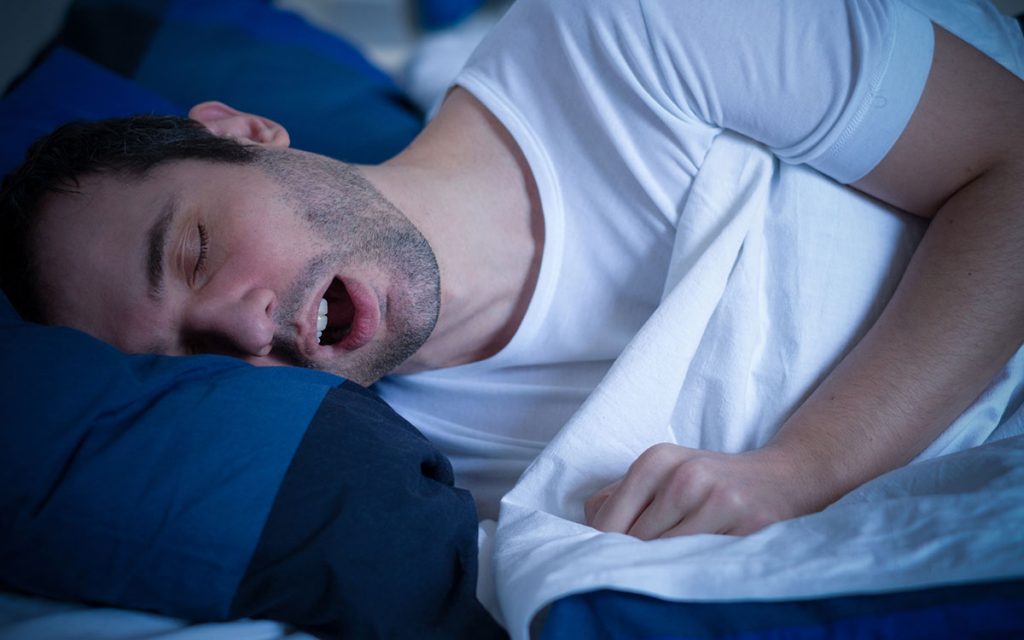There’s snoring, and then there’s snoring. While you might snore more loudly if you’re super tired and finally getting a good night’s sleep (or if you have a cold or congestion, and are trying to get any sleep at all!), chronic loud snoring that’s accompanied by periodic snorts or gasps is actually a sleep disorder called sleep apnea.
If you aren’t the snorer, it’s an annoyance–you might give your partner a nudge or consign yourself to the couch for the night. But if you’re the snorer, it’s important to get this condition checked out. Sleep apnea is related to numerous health issues, and it can even affect your hearing. Here’s what you should know.
What is sleep apnea?
Sleep apnea is actually a breathing disorder–gasping or snorting is the sleeper trying to resume breathing. Obstructive sleep apnea is the most common; breath stops when the throat muscles relax and close. In central sleep apnea, there’s not any physical blockage. The problem is that the sleeper’s brain isn’t properly signaling the muscles that control breathing, causing breathing to stop. Complex sleep apnea is a combination of the first two types.
Estimates vary, but the numbers are consistently staggering: On the low end, the National Sleep Foundation says that about 18 million Americans have the condition; at the high end, the National Sleep Apnea Association puts the number at 25 million. (That’s one in every five adults!) Either way, there are a lot of sleepy people out there, as apnea events–the technical term for the loss of breath that occurs–spur the brain to wake the sleeper enough to resume breathing. It’s no wonder that fatigue, dry mouth, irritability, morning headaches, and memory issues are all symptoms of sleep apnea.
How is sleep apnea related to hearing & sensorineural hearing loss?
No, it’s not about the noise (though persistent exposure to loud noises isn’t great for anyone’s sleep). Sleep apnea is particularly common among people who are overweight, who have Type II diabetes, who have high blood pressure, and/or who have other circulatory system problems. It’s also exacerbated by alcohol and smoking, neither of which are good for everything we just mentioned. These also aren’t helpful to your hearing.
There’s a substantial body of research linking conditions like diabetes and chronic high blood pressure to hearing loss, but less research has been done to date focusing on sleep apnea and hearing loss. Still, the available data shows a link. A much-discussed 2016 study of nearly 14,000 people found that those who had sleep apnea were 30% more likely to have hearing loss, even after controlling for other risk factors (think workplace noise exposure). An older study (okay, from 2012, so not that much older!) linked sleep apnea to sudden sensorineural hearing loss, though only in men.
Though they’ve demonstrated a connection, scientists have only speculated as to why sleep apnea impacts hearing. As you might have guessed from the mention of smoking, high blood pressure, and obesity, the most likely answer has to do with circulation. Lack of proper circulation in the ears can harm the hair-like cells of the cochlea, and inflammation–a major side effect of sleep apnea–can cause damage to the small blood vessels in the ears. Sleep apnea can also alter your blood, leading to even more circulation problems. The body produces more red blood cells in an effort to transport oxygen, which makes blood “thicker” and more prone to clotting. That also means the heart has to work harder to pump blood through the veins, which can cause pulsatile tinnitus.
Is there any good news?
Yes! Though when it comes to treating sleep apnea, your first thought might be those CPAP masks (don’t get us wrong, they’re helpful), lifestyle changes can also make a significant impact. Cutting back on drinking, stopping all tobacco use, exercise, healthier eating, and practicing good “sleep hygiene” can all help mitigate sleep apnea. Since sleep apnea is often related to other health issues, it’s possible that treating those will also help curb sleep apnea. And whether or not you snore, if you’re concerned about your hearing, add seeing a hearing specialist to your to-do list. Snoring may not be pleasant, but there’s a whole world of sounds that you do want to hear.



